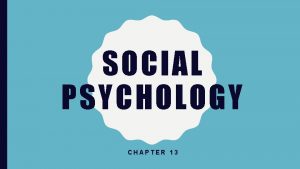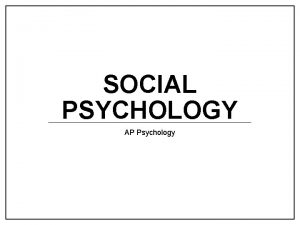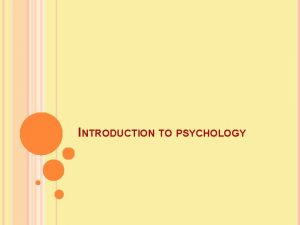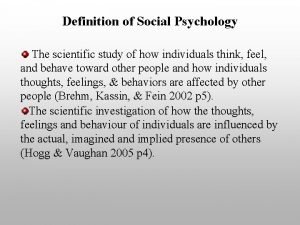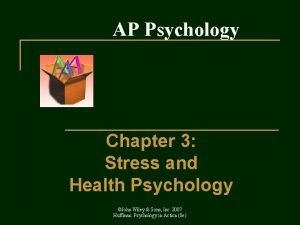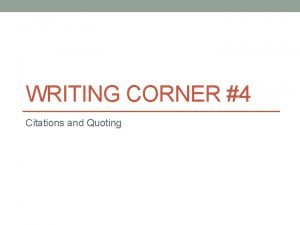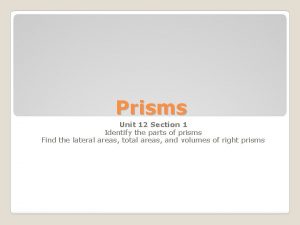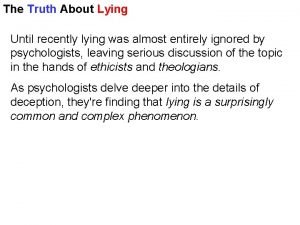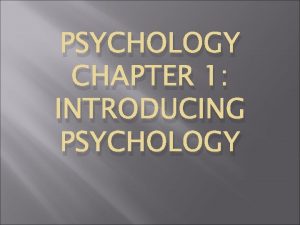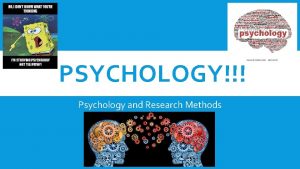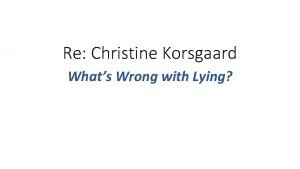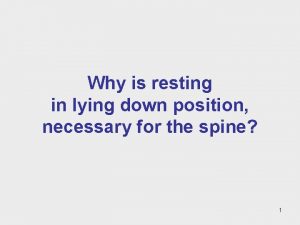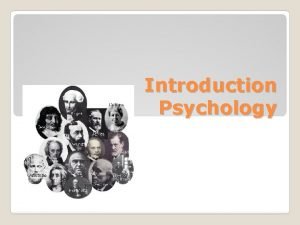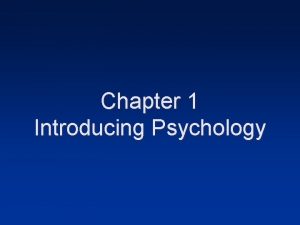Psychology of Lying How and why lying is















- Slides: 15

Psychology of Lying How and why lying is an art…

Psychology of Lying • Three criteria relevant to a statement be classified as a lie: 1. The statement is false. 2. Its producer believes it to be false. 3. It is intended that others believe it to be true. - Raison d’etre (1987)

Psychology of Lying • Forensic Psychology: 4 Theories that suit a liar 1. Deception Theory: - Many theoretical perspectives - 3 such examples: 1. Zuckerman, De. Paulo, & Rosenthal’s (1981) multiple factor model 2. De. Paulo’s Self-Presentational Perspective 3. Buller and Burgoon’s Interpersonal Deception Theory (IDT) (1996)

Psychology of Lying 4 Theories that suit a liar (con’t) • “Fact that people lie will not affect their behavior, speech content, or physiological responses

Psychology of Lying 4 Theories that suit a liar (con’t) 2. People’s Views on How Liars Respond **With exception of prisoners, people do not differ in their beliefs about deception ** Beliefs: a) Liars will react nervously by “looking away” (Global Deception Team, 2006) b) Liars experience cognitive load when telling convincing lies c) People find “odd responses, ” ones that vary from the normal expectations, suspicious (Bond, Omar, Pitre, Lashley, Skaggs, & Kirk, 1992)

Psychology of Lying 4 Theories that suit a liar (con’t) 3. Impression Formation Theory - Impressions & judgments are made quickly & intuitively, and just a mere glance of another person can trigger such impressions and judgments (Ambady, Bernieri, & Richeson, 2000) - Physical appearance is important - Good looking people are typically thought of as more honest (Aune, Levine, Ching, & Yoshimoto, 1993; Bull, 2004; Bull & Rumsey, 1988)

Psychology of Lying 4 Theories that suit a liar (con’t) 4. Persuasion Theory - Effective communication is key to successful lying, b/c perceived as “likeable” - Characteristics included in this theory: * Direct eye gaze *Smiling *Head nodding * Leaning forward * Posture mirroring

Psychology of Lying • Characteristics of Good Liars - Personality: Manipulators, Actors, Expressive People - Behavior: Honesty, Likeability, Natural Performers - Emotions: Lack of feelings of Guilt & Fear, Ability to Camouflage emotions

Psychology of Lying • Characteristics of Good Liars (con’t) - Cognitive Load: Do not experience much cognitive load - Decoding Skills: Liars adapt their responses if responses raise suspicions in receiver

Psychology of Lying • “Neuro-Linguistic Programming” – Dr. Derren Brown Eye Accessing Cues Up and to the Left – Visualizing a true image Up and to the Right - Putting together a false image Down and to the Left – True dialog Down and to the Right – Emotion Straight to the Left – Sounds: True sound/Voice Straight to the Right – Creating a sound/Voice

Psychology of Lying • What if you cannot see them/their eyes? Things to look for: - Fast talking - Sound nervous/anxious - Cough/clear throat for no reason - Laugh softly for no reason – Overly persuasive - Listen to their facts, then run story by them again - Voice talks in higher pitch - ** Common Behaviors – Agitation & Anxiousness

Psychology of Lying • Compulsive Liars - Pseudo logia fantastica – behavior of habitual/compulsive lying - Robert Reich, M. D. - “It has to do with selfesteem. You want to be like someone else because you aren’t very happy with yourself. ”

Psychology of Lying • Extra Tips 1. 2. 3. 4. 5. 6. 7. 8. 9. 10. Inconsistencies Catch liars off guard – Ask unexpected questions Look for changes from normal behavior Look for Insincere Emotion – Angry face with a smile Pay attention to Gut Reaction Watch for very quick reactions-most won’t see Look for Contradictions A Sense of Unease Too much Detail Logic Has it’s Place

Psychology of Lying • References lying and deception – raison detre, Penguin Book of Lies, (Published 1987), Telling Lies, http: //psychology. jrank. org/pages/1414/lyingdeception. html#ixzz 0 g. Ssniq. X 1 http: //www. thepalmbeachtimes. com/Pages/How. To. Spot. ALiar. p hp http: //www. forensicpsychologyunbound. ws/ - 2009. 1: E 56 -E 57

Psychology of Lying • References (con’t) http: //www. helium. com/items/806463 -how-to-tell-if-somebody -is-lying. com http: //www. psychologytoday. com/print/25000
 Why why why why
Why why why why Don't ask why why why
Don't ask why why why Anthony and cleopatra are lying dead on the floor
Anthony and cleopatra are lying dead on the floor Buttocks medical terminology
Buttocks medical terminology Low-lying clouds that produce rain and snow
Low-lying clouds that produce rain and snow Positive psychology ap psychology definition
Positive psychology ap psychology definition Mere exposure effect psychology
Mere exposure effect psychology Fundamental attribution error ap psychology
Fundamental attribution error ap psychology Nature and scope of psychology
Nature and scope of psychology Social psychology is the scientific study of:
Social psychology is the scientific study of: Health psychology definition ap psychology
Health psychology definition ap psychology Venetian blinds contemporary study of compulsive lying
Venetian blinds contemporary study of compulsive lying Congruent polygons lying in parallel planes
Congruent polygons lying in parallel planes Crock lying
Crock lying Positions use in nursing patients
Positions use in nursing patients 1. susan was lying in the sun. she got sunburned.
1. susan was lying in the sun. she got sunburned.






